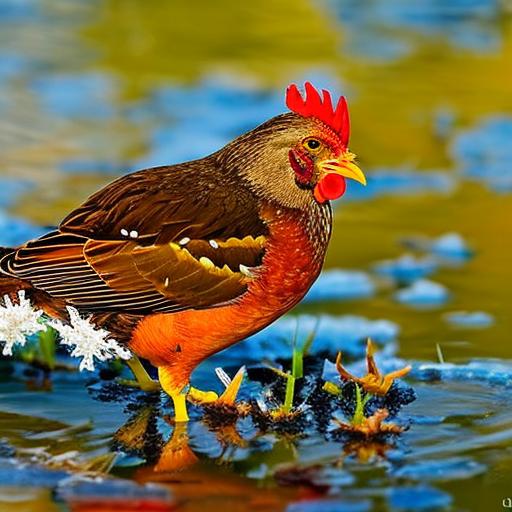Water is an essential element for the health and well-being of chickens, especially during the winter months. Just like humans, chickens need water to survive and stay hydrated. However, in cold weather, water can freeze, making it difficult for chickens to access and causing potential health issues. It is crucial for chicken owners to understand the importance of providing unfrozen water to their flock during winter.
Water plays a vital role in regulating a chicken’s body temperature and digestion. Chickens do not have sweat glands like humans, so they rely on panting and evaporative cooling to regulate their body temperature. In order to pant effectively, chickens need to be properly hydrated. Additionally, water is essential for digestion as it helps break down food and aids in nutrient absorption. Without access to water, chickens may become dehydrated and suffer from digestive issues.
Key Takeaways
- Water is crucial for your chickens’ health during winter
- Heated waterers and insulated waterers can prevent freezing
- Warm water and salt can also lower the freezing point
- Regularly checking and refilling the waterer is important
- Maintaining the waterer and avoiding common mistakes can benefit your chickens’ health
Method 1: Using Heated Waterers for Your Chickens
One effective method to ensure your chickens have access to unfrozen water during winter is by using heated waterers. Heated waterers are designed to keep the water at a temperature above freezing, preventing it from turning into ice. These waterers typically have a built-in heating element that warms the water and keeps it at a consistent temperature.
Using heated waterers has several benefits. Firstly, it ensures that your chickens have access to clean and unfrozen water at all times. This is crucial for their hydration and overall health. Secondly, heated waterers save you time and effort as you don’t have to constantly check and replace frozen water. Lastly, they provide peace of mind knowing that your chickens are well taken care of even in freezing temperatures.
When purchasing a heated waterer, it is important to choose one that is specifically designed for poultry use. Look for models that are made from durable materials and have a thermostat-controlled heating element. It is also recommended to choose a waterer with a capacity that suits the size of your flock. Additionally, consider the power source required for the heated waterer and ensure it is compatible with your setup.
Method 2: Insulating Your Chicken’s Waterer to Prevent Freezing
Another effective method to prevent your chicken’s water from freezing is by insulating their waterer. Insulation helps retain heat and prevents the water from reaching freezing temperatures. There are several ways to insulate your chicken’s waterer.
One method is to wrap the waterer with insulation material such as foam or bubble wrap. This creates a barrier between the cold air and the water, helping to maintain its temperature. Another option is to place the waterer inside an insulated container or box. This provides an extra layer of insulation and further protects the water from freezing.
Insulating your chicken’s waterer has several benefits. It helps maintain the water at a temperature above freezing, ensuring that your chickens have access to unfrozen water. Additionally, it reduces the risk of the waterer cracking or breaking due to freezing temperatures. Insulation also helps conserve energy by reducing heat loss from the water.
When choosing insulation materials, make sure they are non-toxic and safe for your chickens. Avoid using materials that can easily absorb moisture or become moldy. It is also important to regularly check and replace any damaged or worn-out insulation to maintain its effectiveness.
Method 3: Using Warm Water to Fill Your Chicken’s Waterer
| Method 3: Using Warm Water to Fill Your Chicken’s Waterer |
|---|
| Benefits |
| – Helps prevent dehydration in chickens |
| – Encourages chickens to drink more water |
| – Can help prevent freezing in cold weather |
| Instructions |
| – Fill waterer with warm water |
| – Check waterer regularly and refill as needed |
| – Clean waterer regularly to prevent bacteria growth |
Using warm water to fill your chicken’s waterer is another effective method to prevent freezing during winter. By filling the waterer with warm water, you can delay the freezing process and provide your chickens with access to liquid water for a longer period of time.
To use warm water, simply heat it up before filling the waterer. You can use hot tap water or heat it on a stove or microwave. It is important to note that the water should not be too hot as it can harm your chickens. Aim for a temperature that is slightly warm to the touch.
Using warm water has several benefits. Firstly, it helps delay the freezing process, ensuring that your chickens have access to liquid water for a longer period of time. This reduces the frequency of checking and refilling the waterer. Secondly, warm water can help raise the overall temperature inside the waterer, making it less likely to freeze quickly. Lastly, using warm water can provide a temporary source of warmth for your chickens, especially during extremely cold weather.
When using warm water, it is important to handle it with care and avoid any spills or accidents. Make sure to use appropriate containers and avoid using boiling water. Always test the temperature of the water before filling the waterer to ensure it is safe for your chickens.
Method 4: Adding Salt to Your Chicken’s Water to Lower the Freezing Point
Adding salt to your chicken’s water is another method to lower the freezing point and prevent it from turning into ice. Salt lowers the freezing point of water, allowing it to remain in a liquid state at lower temperatures.
To add salt to your chicken’s water, simply dissolve a small amount of salt in the water before filling the waterer. It is important to use food-grade salt and avoid using excessive amounts as it can be harmful to your chickens.
Adding salt to your chicken’s water has several benefits. Firstly, it helps lower the freezing point of the water, preventing it from turning into ice quickly. This ensures that your chickens have access to liquid water for a longer period of time. Secondly, salt provides essential minerals that are beneficial for your chickens’ health. Lastly, adding salt can help prevent dehydration in chickens during winter as they tend to drink less when the water is cold.
When adding salt, it is important to use it in moderation. Excessive salt can be harmful to chickens and may lead to health issues. Consult with a veterinarian or poultry expert to determine the appropriate amount of salt to add to your chicken’s water.
Method 5: Checking and Refilling Your Chicken’s Waterer Regularly

Regardless of the method you choose to prevent your chicken’s water from freezing, it is important to regularly check and refill the waterer during winter. Cold temperatures can cause water to freeze quickly, so it is crucial to ensure that your chickens always have access to unfrozen water.
Check the waterer at least twice a day, preferably in the morning and evening. Look for any signs of freezing or ice formation and remove any frozen water. Refill the waterer with fresh, unfrozen water to ensure that your chickens stay hydrated.
Making checking and refilling the waterer a routine is essential for your chickens’ health and well-being during winter. It ensures that they have access to clean and unfrozen water at all times, preventing dehydration and potential health issues. Additionally, regular monitoring allows you to identify any issues with the waterer or the water source and address them promptly.
Tips for Maintaining Your Chicken’s Waterer during Winter
In addition to the methods discussed above, there are several tips for maintaining your chicken’s waterer during winter:
1. Clean and sanitize the waterer regularly: Regularly clean and sanitize the waterer to prevent bacterial growth and contamination. Use mild soap or poultry-safe disinfectants and rinse thoroughly before refilling.
2. Provide multiple waterers: If you have a large flock, consider providing multiple waterers to ensure that all chickens have access to unfrozen water. This also reduces competition and prevents bullying among chickens.
3. Protect the waterer from wind and drafts: Place the waterer in a sheltered area or use windbreaks to protect it from cold winds and drafts. This helps maintain the water’s temperature and prevents freezing.
4. Use heated bases or pads: If using traditional waterers, consider using heated bases or pads to prevent freezing. These devices provide a source of heat that keeps the water above freezing temperatures.
5. Insulate the water source: Insulate the pipes or hoses that supply water to the waterer to prevent them from freezing. Use insulation materials or heat tape to protect the water source from cold temperatures.
Common Mistakes to Avoid When Preventing Your Chicken’s Water from Freezing
When preventing your chicken’s water from freezing, there are some common mistakes to avoid:
1. Using chemicals or additives: Avoid using chemicals or additives that are not safe for chickens. Stick to safe methods such as insulation, heated waterers, warm water, and salt.
2. Neglecting to check and refill regularly: Neglecting to check and refill the waterer regularly can lead to frozen water and dehydration in chickens. Make it a routine to check and refill at least twice a day.
3. Using excessive amounts of salt: Adding excessive amounts of salt can be harmful to chickens. Use salt in moderation and consult with a veterinarian or poultry expert for guidance.
4. Using inappropriate insulation materials: Avoid using insulation materials that can easily absorb moisture or become moldy. Choose non-toxic and safe materials for insulating your chicken’s waterer.
5. Overlooking cleaning and sanitizing: Regularly clean and sanitize the waterer to prevent bacterial growth and contamination. Neglecting this can lead to health issues in chickens.
Benefits of Preventing Your Chicken’s Water from Freezing
Preventing your chicken’s water from freezing has several benefits:
1. Ensures hydration: By providing unfrozen water, you ensure that your chickens stay hydrated even in cold weather. This is essential for their overall health and well-being.
2. Prevents dehydration: Dehydration can lead to serious health issues in chickens. By preventing the water from freezing, you reduce the risk of dehydration and associated problems.
3. Improves digestion: Water is essential for digestion as it helps break down food and aids in nutrient absorption. By providing unfrozen water, you ensure that your chickens can properly digest their food.
4. Reduces stress: Access to unfrozen water reduces stress in chickens as they do not have to struggle to find water or drink from frozen sources. This promotes a calm and healthy environment for your flock.
5. Saves time and effort: Using methods to prevent freezing saves you time and effort as you don’t have to constantly check and replace frozen water. This allows you to focus on other aspects of chicken care.
Keeping Your Chickens Happy and Healthy during Winter
In conclusion, providing unfrozen water for your chickens during winter is crucial for their health and well-being. Water plays a vital role in regulating their body temperature and digestion. By using methods such as heated waterers, insulation, warm water, salt, and regular checking and refilling, you can ensure that your chickens have access to clean and unfrozen water at all times.
Remember to regularly clean and sanitize the waterer, provide multiple waterers if necessary, protect the waterer from wind and drafts, and insulate the water source. Avoid common mistakes such as using chemicals or additives, neglecting to check and refill regularly, using excessive amounts of salt, using inappropriate insulation materials, and overlooking cleaning and sanitizing.
By preventing your chicken’s water from freezing, you improve their health, reduce stress, save time and effort, and create a happy and healthy environment for your flock during winter. Take the necessary steps to keep your chickens hydrated and thriving even in freezing temperatures.
If you’re looking for ways to keep your chickens’ water from freezing during the winter months, you might also be interested in learning about how to insulate a chicken coop. Insulating your coop can help regulate the temperature inside, keeping your chickens warm and comfortable. Check out this informative article on how to insulate a chicken coop for some helpful tips and tricks.
FAQs
What causes chicken water to freeze?
The main cause of chicken water freezing is the low temperature during winter. When the temperature drops below freezing point, the water in the chicken’s waterer freezes.
Why is it important to keep chicken water from freezing?
It is important to keep chicken water from freezing because chickens need access to clean water at all times. If their water freezes, they may become dehydrated, which can lead to health problems and even death.
What are some ways to keep chicken water from freezing?
Some ways to keep chicken water from freezing include using heated waterers, adding insulation to the waterer, using a heated base, and using a water heater.
What is a heated waterer?
A heated waterer is a waterer that has a built-in heating element that keeps the water from freezing. These waterers are designed to be used in cold weather and are available in different sizes and styles.
What is a heated base?
A heated base is a device that is placed under the chicken waterer to keep the water from freezing. The base is plugged into an electrical outlet and heats up the waterer from the bottom.
What is a water heater?
A water heater is a device that is installed in the chicken coop to heat the water. These heaters are available in different sizes and styles and are designed to be used in cold weather. They are usually powered by electricity or propane.
Meet Walter, the feathered-friend fanatic of Florida! Nestled in the sunshine state, Walter struts through life with his feathered companions, clucking his way to happiness. With a coop that’s fancier than a five-star hotel, he’s the Don Juan of the chicken world. When he’s not teaching his hens to do the cha-cha, you’ll find him in a heated debate with his prized rooster, Sir Clucks-a-Lot. Walter’s poultry passion is no yolk; he’s the sunny-side-up guy you never knew you needed in your flock of friends!







